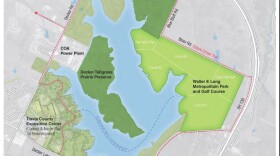From the Austin Monitor:
In a major shift, Decker Lake Golf LLC representatives have proposed a new plan they say would not use reclaimed water to irrigate a PGA-class golf course proposed for Walter E. Long Metropolitan Park.
The company’s vice president, Warren Hayes, told the Water and Wastewater Commission on Wednesday that he and his associates would pump brackish water from the Hosston formation of the Trinity Aquifer, which is not part of the city’s water portfolio.
City Council is scheduled to consider the item at its next regular meeting Feb. 26. The previous Council set that date after postponing the controversial item last year.
Several commissioners expressed at the meeting that they had not previously heard of such a plan, and approached the issue with caution.
Commission Chair Dale Gray told the Monitor on Friday, “I think that sounds like a decent source for water. But, like everything, all of these water issues are very complex, and it would need to be vetted out a little bit before I would say, yeah, that’s a great source of water, or no, I don’t think it’s a great source of water.
“I appreciate the group trying to find ways to work with the city on their water supply issues, and I think that’s what they’re attempting to do,” Gray continued.
Hayes told the Monitor on Saturday that his company began looking into the alternative water source when it became clear that the idea of using reclaimed water was “plummeting” in popularity.
Council, for example, postponed a plan in November that involved using reclaimed water after Austin Water Utility Director Greg Meszaros said the city would like to use reclaimed water to complement the local water supply.
Hayes said that the Texas Water Development Board has deemed the proposed water source unfavorable for potable water development. “The only thing you can really do with this water is irrigate with it,” he said. “That’s the only purpose this water could really serve anybody.”
Hayes said that, if Council were to approve the plan, his company would drill the well directly under the parkland or adjacent private property and use about 500 acre-feet of water per year, or 165 million gallons.
Meszaros said Wednesday that although he’s “not a groundwater expert by any means” and his department hasn’t evaluated the proposal, he believes it is “an option that has some merit to consider as an alternative to reclaimed water.”
Meszaros recommended having the Watershed Protection Department evaluate the proposal. “I don’t know what risks there may be,” he said. “At face value, I wouldn’t throw it off the table. I think it’s worth considering.”
Rather than adopt a resolution, commissioners voted to write a letter to the mayor and Council that urges them to carefully consider any direct or indirect impacts that potential projects like the Decker Lake golf course could have on the city’s current and future water sources.
Gray, who is writing the letter, said that it will “remind the Council that we’ve got some water constraints here, that the utility is diligently working through some potential solutions and that Council just needs to think about that stuff before they act on proposals.”
Gray said Council should “continue to support the recommendations that came out of the Water Resource Planning Task Force, specifically related to the use of Decker Lake in any sort of water supply capacity.”
Council created the Austin Water Resource Planning Task Force in April to recommend ways the city could deal with the current drought. The group released a report in July that identified Decker Lake as potential off-channel storage to augment the local water supply.
Hayes said that he and his associates would cooperate with the city on this issue. “We have pulled our clubhouse — basically the waterfront clubhouse — we’ve pulled it off the shores of Decker Lake,” he said. “We’ve agreed to maintain a 150-foot setback behind the wetlands, and so, if the lake has to get drawn down, it won’t interfere with our business operations at all.”
Public input at the meeting was largely in support of the golf course, though there were opposing voices as well.
Those who argued in support of the plan said it would provide a boost to nearby neighborhoods that have suffered for decades from a lack of economic drivers and basic features like grocery stores.
Those who argued against the plan raised concerns about the water supply and said that the land, which is largely fenced off, would be better and more fairly used as parkland.
If Council approves the plan, the Parks and Recreation Department would likely sign a 50-year license agreement with the company to operate the course.


